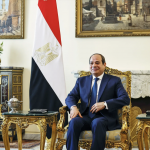By The Wall Street Journal –
Incumbent, who won re-election with 89.6% of the votes, faces tough choices over the Gaza war and Egypt’s deteriorating economy
Egypt’s Abdel Fattah Al Sisi was re-elected president in an election in which he faced no serious competition, but his third term comes with one of the biggest challenges for his leadership—preventing a spillover of the war in neighboring Gaza.
Sisi, a former general (..), has long presented himself as a stable partner in a turbulent Middle East to gain support from the U.S. and other Western countries. He is now under growing international pressure to allow into Egypt tens of thousands of Palestinians trying to flee the fighting between Israel and militant group Hamas.
How Sisi manages risks from the Gaza conflict could affect his next six years in power, after Egypt’s National Election Authority on Monday announced that he had won 89.6% of the votes cast over three days in the country starting Dec. 10. His win was expected as the election featured three other little-known candidates, while one of Sisi’s most vocal opponents, a former journalist, was barred from running and saw his campaign members detained amid a wider crackdown on political dissent and opposition.
The Palestinian push for an independent state is a popular cause in Egypt and ordinary Egyptians have debated how Cairo should help alleviate the humanitarian crisis in Gaza. Some Egyptians support taking in Palestinian refugees, while many others say such a move would seemingly dilute the cause, especially if Palestinians can’t return to Gaza soon.
A deepening economic crisis at home means that hosting Palestinians could further stretch Egyptian government finances, although authorities would expect substantial humanitarian aid to support the refugees, analysts say. Egypt’s economy was already in dire straits before the war erupted next door. Its debt pile has ballooned, while repeated currency devaluations have propelled inflation to staggering levels, pushing many Egyptian families into poverty.
Bashir Abdel Fattah, a political analyst at the state affiliated research institute Al-Ahram Center for Political and Strategic Studies, said that Sisi faces a “difficult and complex” period ahead, with the economy being most pressing. “Egypt needs to find ways to reduce its debt and stabilize its currency,” he said.
Inflation in Egypt eased to 34.6% in November from a high of 38% in September. External debt jumped to $162.9 billion by December 2022 from below $40 billion in 2015, according to data released by the Central Bank of Egypt.
Political analysts say that Sisi will need to manage the border situation with Gaza carefully in the coming months, as opening up to Palestinian refugees also carries security risks for Sisi who spent the last decade fighting militancy in the Sinai Peninsula.
The Wall Street Journal previously reported that Egyptian authorities are preparing to allow hundreds of Palestinian refugees in, as more of them gather in Gaza’s southern border town of Rafah to try to flee Israeli airstrikes.
Some Egyptians see admitting Palestinians as both a security risk and a move that would weaken the Palestinian cause. “We want peace,” said Al-Hend Al-Helali, a 47-year-old administrative employee at Cairo University. “But we don’t want it at the expense of our security or the Palestinian cause.”
Egypt has been a mediator alongside Qatar in negotiations between Hamas and Israel to let more humanitarian aid into Gaza, allow hundreds of foreign nationals to exit to Egypt and free hostages in Gaza. Some Egyptians see Sisi as walking a fine line so far, but handling matters better than many other Arab leaders.
“The Egyptian people are very passionate about the Palestinian cause and seeing their leader support it and back Palestinians boosted his popularity a lot,” said Sherine Mounir, a pharmacist in Cairo.
“Sisi has consistently announced his rejection of allowing the forcible displacement of Palestinians, and he has allowed injured people to cross into Sinai for treatment,” she said.
Still, dissatisfaction among ordinary Egyptians threatens to stoke public protest against Sisi, human rights activists said. Authorities arrested dozens of protesters when a pro-Palestinian demonstration in Cairo in October reached the historic Tahrir Square and some people began chanting about social justice, freedom and bread.
Another protest earlier that month in the coastal city of Marsa Matruh was quickly put down, as demonstrators called for Sisi to step down, according to rights activists.
Voting was tightly controlled last week, with authorities busing in voters and offering handouts so people would support Sisi, rights activists said. Posters of Sisi have been ubiquitous in the capital of Cairo, while Egyptian television has broadcast scenes of large crowds celebrating Sisi, waving flags and blaring national songs from loudspeakers near polling stations across the country.
A spokesman for Sisi and the National Election Authority didn’t respond to requests for comment.
Sisi came to power in a military coup in 2013 that overthrew a democratically elected president. He then won two presidential elections by landslides in 2014 and 2018. The margins were questioned by his political opponents in both instances.
In the latest election, almost 45 million people, or 66.8% of total eligible voters, turned out to vote, according to the National Election Authority. That is almost twice the number that authorities said voted in 2018.
______________________________
PHOTO: GEHAD HAMDY/ZUMA PRESS





